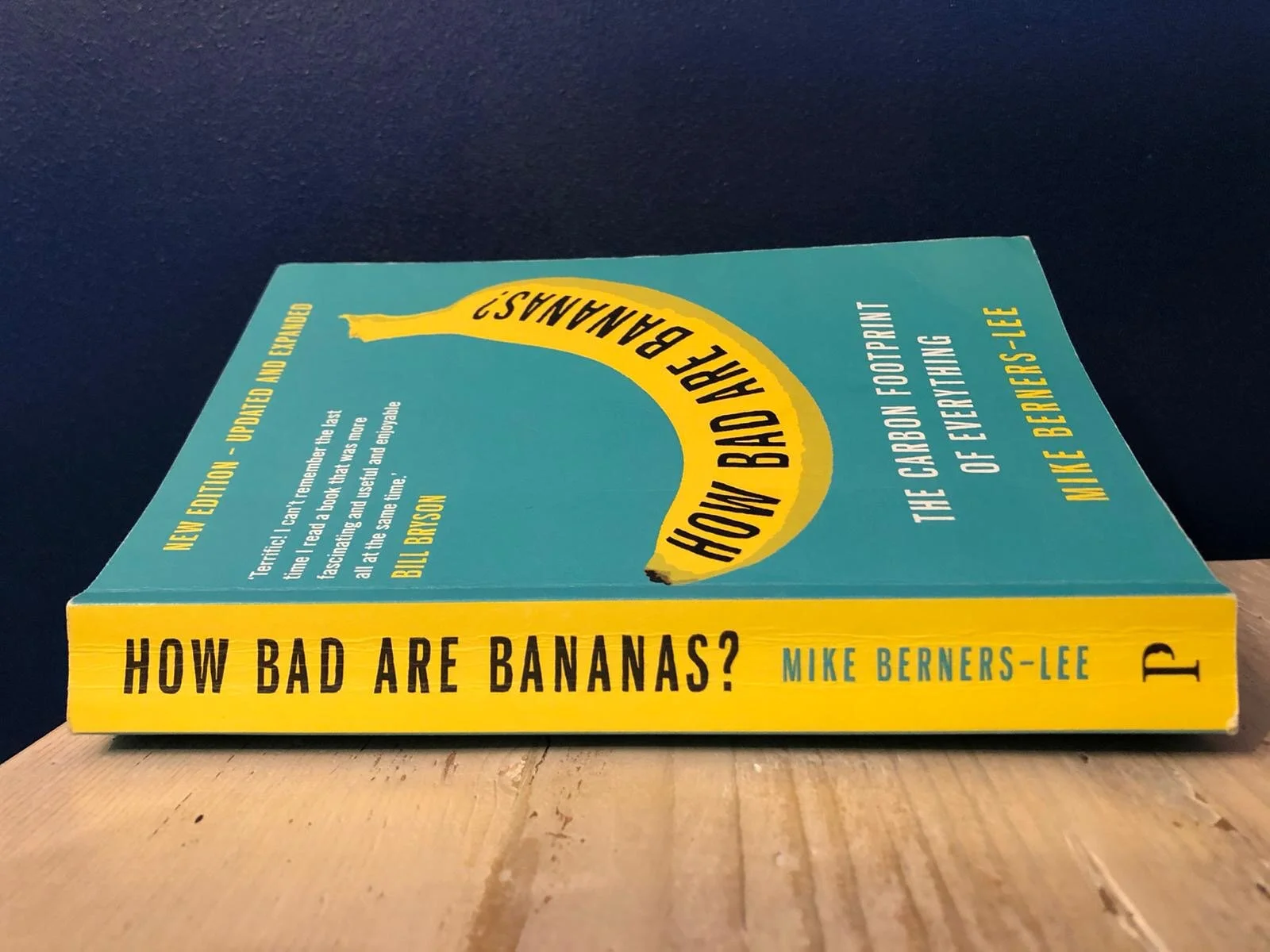How Bad Are Bananas (Updated 2020 Edition)
by Mike Berners-Lee
Welcome to our ‘Book On A Page’ where we bring you the best of the best in a jiffy.
Why this book? Because it’s written by carbon guru Mike Berners-Lee and he knows his non-air-freighted onions.
The gist: First published in 2010, he’s updated it to reflect improvements (mainly because of renewable energy), significant challenges (runaway consumption, deforestation, etc), as well as solutions (one of which encouragingly is us). Perhaps, though, most of all it’s to remind us of the increasing urgency, reiterating we have no time to lose. He gives us the low-down on the good, the bad and the ugly, so we can each up (or more precisely lower) our game, develop a ‘carbon instinct’ for all the choices we make every day and play our pivotal part. The average UK footprint is 13 tonnes CO2e and the target is 5 (!). That’s HARD. Let’s aim for 10 as a start…?
For 1 cow’s milk latte you could have 9 Americanos or 25 black teas.
An electric van supermarket delivery is on average 7 times more efficient than if you drive yourself.
For the same impact as a full bath from an efficient gas boiler, you could have a 15-minute power shower (bad luck Sonia).
King prawns (because mangroves are destroyed to farm them) are actually worse than meat. Who knew?! (bad luck Aimee).
If your diet was as carbon heavy as long-haul asparagus, your food would have a footprint of over 80 tonnes (!). Air freighted food is a no-no in a low carbon world.
London to Glasgow and back is actually better to do by plane, rather than driving an SUV. This isn’t to advocate flying but to showcase how harmful some vehicles can be!
And for the most bizarre computation. If your cycling calories come from burgers, emissions are about the same as driving. Going vegan, slices 40% off your footprint.
Wildfires emitted 8.6 billion tonnes CO2e in 2019.
Deforestation accounts for 5-10 billion tonnes per year.
Fossil-fuel reserves - burning the ‘proven reserves’ of coal, gas, and oil would release 5.3 trillion tonnes of CO2e. They absolutely have to stay in the ground.
Daunting right? But in case we think well there’s just no point in skipping a king prawn and hopping into a hot tub instead, there’s two points to make. If we all made those small changes it = big change. Second, it’s precisely why getting our voice behind the big issues seriously counts. Telling supermarkets we won’t buy products that have contributed to deforestation. Telling our banks we’re going to switch to ones that don’t fund fossil fuels. Informing our governments that it is unacceptable/bonkers/criminal to open a coal mine in this day and age. That’s power. We’ll be bringing them to you. You just have to click.
What next?
Have a quick check in with your footprint. Then choose at least one biggie to focus on and go for it.
We…
Aimee: I love this book (and the original) - the contents pages alone (listed in order of impact) are a great ready-reckoner. From the last book, learning that using the Dyson air-dryer vs. a paper towel is the best bet, makes me feel a little smug every time I make the informed choice! And from the new edition: that a weekend newspaper every week that isn’t recycled can make up a whopping 5% of your carbon budget - time to switch to an online subscription!
Sonia: When I measured my footprint last year it was a whopping 20 tonnes!!! I just couldn’t believe it. This year (the pandemic has helped) I’m down to just under 10. Tra la la. Proof this stuff we all do together works. On the other hand Mike Berners-Lee says the most carbon friendly pet we can have is a goldfish. THAT for me is beyond the call of duty. What’s a world without dogs? Cats on the other hand…
“How low can you go?”




